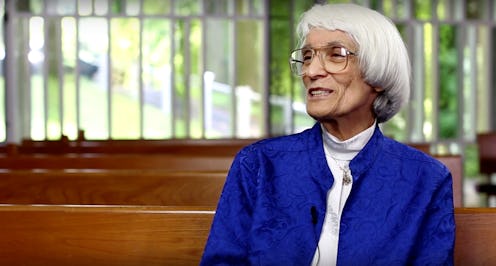News
Here’s How People Are Remembering The Woman Behind Title IX
On Tuesday, pioneering women's rights activist Bernice Sandler died at the age of 90. Sandler tirelessly pushed for equal protections for women in academia, and is often referred to as "the Godmother of Title IX" for her role in advancing the landmark federal legislation banning gender discrimination in public schools. Here's how lawmakers, women's rights organizations and activists are celebrating Sandler's life in light of her passing.
On Twitter, New York Rep. Carolyn B. Maloney said that Sandler "singlehandedly formulated the first legal argument for fighting sex discrimination in academia," and pledged to re-introduce legislation to establish a Smithsonian Women's Museum to honor Sandler and other champions of women's rights.
"Bernice Sandler was an inspiration to countless women who were inspired by her example and empowered by her accomplishments," National Organization for Women President Toni Van Pelt said in a statement, and successfully "embarked on a lifelong mission to change the culture of sex discrimination on college campuses."
The Planned Parenthood Action Fund tweeted that "it's up to us to protect Bernice Sandler's legacy." In a subsequent tweet, the organization noted the efforts of Education Secretary Betsy DeVos to water down Title IX protections: DeVos has proposed narrowing the definition of "sexual harassment," limiting the type of reports that campuses are required to investigate, and potentially requiring accusers to be cross-examined by their alleged abusers.
Title IX was passed in 1972, and Sandler played an instrumental role in bringing it about. As a part-time teacher at the University of Maryland years earlier, Sandler learned although there were seven openings for positions in her department, the faculty hadn't even considered her for any of them. When she talked to a male faculty member about this, he acknowledged that her qualifications were excellent.
"But let's face it," her male colleague continued. "You come on too strong for a woman."
Over the next two months, Sandler later wrote, she was rejected from two more positions on account of her gender. One employer explicitly told her that he didn't hire women, while another said that she was "not really a professional," but rather, "just a housewife who went back to school."
"Although later, in retrospect, I would discover other instances of sex discrimination in my life, at that point I had not consciously noticed it," Sandler wrote in 1997. "Yet here were three incidents within a short period which I could not rationalize away. I began to think about the ramifications of discrimination and the burgeoning women’s movement, and to explore how the law treated sex discrimination. Knowing that sex discrimination was immoral, I assumed it would also be illegal."
She was right. Sandler began researching civil rights law in the United States, and in a moment that changed the course of U.S. history, noticed a footnote regarding Executive Order 11246, which prohibited federal contractors from discriminating on the basis of race, religion or nationality. It seems that a year earlier, in a little-noticed move, President Lyndon Johnson had amended that order to include gender discrimination.
"Even though I was alone, I shrieked aloud with my discovery," Sandler wrote. "I had made the connection that, since most universities and colleges had federal contracts, they were forbidden from discriminating in employment on the basis of sex. Yes, there was a legal route to combat sex discrimination, even though few people knew it at the time."
Over the course of the next several years, Sandler filed administrative complaints against more than 250 academic institutions, arguing that they were openly discriminating against women in defiance of federal law. She worked with Rep. Edith Green, a Democrat from Oregon, to document gender discrimination in education and hold hearings on the topic, and the record of those hearings eventually formed the basis for Title IX, the New York Times reports.
Sandler was inducted into the National Women's Hall of Fame in 2013, and received 12 honorary degrees for her work.
